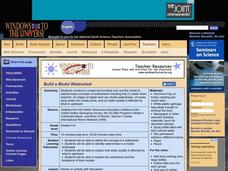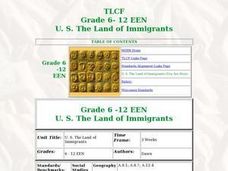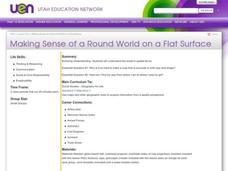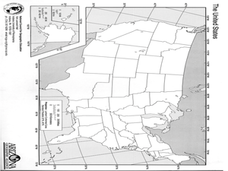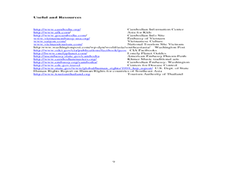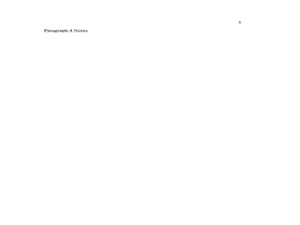Roy Rosenzweig Center for History and New Media
Continental Differences
Middle schoolers break into groups and closely investigate primary sources associated with the seven different continents. After deciding which continent their primary sources relate to, representatives from each group present their...
Curated OER
Build a Model Watershed
Collaborative earth science groups create a working model of a watershed. Once it has been developed, you come along and introduce a change in land use, impacting the quality of water throughout their watershed. Model making is an...
Curated OER
Where is Shirley the Elephant?
Young animal lovers engage in a lesson that's all about elephants. They access an elephant sanctuary website and read a story about Shirley the elephant. They perform a series of activities based upon that story, and also study about the...
Teach Engineering
Earthquakes Living Lab: Locating Earthquakes
There are patterns in nearly everything — even earthquakes. Pairs research current earthquakes to see if there are any patterns. They determine the mean, median, and mode of the earthquake data, along with the maximum and minimum. Using...
Curated OER
The Land of Immigrants
Students access information and data about US immigration using the Internet and other sources. They identify from research data the countries from which the largest number of immigrants to the US come from and create a database of these...
Curated OER
Native Americans of the USA
Students, in cooperative groups, research a variety of Native American tribes on the Internet and complete corresponding activities. They participate in a play about Native Americans by Sandra Widener.
Curated OER
Spice Up Your Life
Second graders identify major spices found in the world. They link spices with countries they are grown in and the uses for these valuable items.
Curated OER
The Mysteries of El Nino: How Much do We Really Know?
Seventh graders investigate the causes and effects of El Nino and explore its global impact on weather related occurrences through this series of activities.
Curated OER
Time and Time Again
Students analyze the effects of time zone differences on how we function as a global community, focusing particularly on the turn of the millennium as a way for students to calculate time zone differences.
Curated OER
Making Sense of a Round World on a Flat Surface
Students explain the world in spatial terms
Curated OER
Natural Hazards
Students evaluate the hazards of naturally occurring events. After watching a video concerning safety hazards, students work in groups to discuss the safety issues involved in taking a trip to a mountainous region. Recommendations are...
Curated OER
BIGGER AND BIGGER: (We Live in a family, a neighborhood, a city, and the United States)
Students discover that they are part of bigger and bigger groups. They begin with families and work up to belonging to North America as they initiate a study of the whole country.
Curated OER
What is Climate?
Learners explore the differences between climate and weather. For this introductory lesson of a climate unit, students discuss the vocabulary and concepts associated with weather and climate. They build their information base for the...
Curated OER
Treasure of the Tar
Learners, using an atlas, locate the region known as the "Tar Sands" in the Central Plains of Canada. They hypothesize about the future economic potential of this natural resource. They create a poster about the Tar Sands industry in...
Curated OER
Route 66 And Population Patterns
Learners investigate the geography located along Route 66. They research how the population patterns change in certain areas along the highway. Students use the information in order to form hypotheses about how and why the population...
Curated OER
An Introduction To Southeast Asia Today
Learners investigate the region of Southeast Asia. They research the history, geography, and spread of ethnicity throughout the region. The various lessons consist of class discussion and group work to find common themes shared in...
Curated OER
Puerto Rican Migration Historical Fiction Story
Students investigate the experience of Puerto Rican immigrants to America. In this immigration lesson, students research the challenges that Puerto Rican immigrants faced and then write historical fiction selections that reflect their...
Curated OER
National expansion of the United States (1815 to 1850), and its connection to local Illinois history.
Students discuss the importance of establishing the I & M Canal water route. They watch a video about the canal's history. They collect and write a personal migration story by interviewing a family member. They analyze trends and...
Curated OER
Who We Are: To Know the Characteristics of a Population Within Certain Domains
Young scholars, through research, discover the characteristics of the population of Quebec and compare them to those of Canada as a whole. They create a class presentation about information they found.
Hans Lohninger
Photo Globe: Suriname
Examines general country specific facts about Suriname in a well organized chart form. Content includes: geography, people, government, economy, communications, transportation, military, and transnational issues. This site is enriched by...
Annenberg Foundation
Annenberg Learner: America's History in the Making: Mapping Initial Encounters
Columbus' arrival laid the basis for encounters between Europeans, Native Americans, and Africans. This unit examines how these contacts altered the way of life of peoples around the globe.
Curated OER
Photo Globe: Suriname
Examines general country specific facts about Suriname in a well organized chart form. Content includes: geography, people, government, economy, communications, transportation, military, and transnational issues. This site is enriched by...



